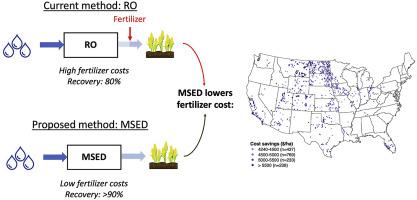当前位置:
X-MOL 学术
›
J. Membr. Sci.
›
论文详情
Our official English website, www.x-mol.net, welcomes your feedback! (Note: you will need to create a separate account there.)
Brackish water desalination for greenhouses: improving groundwater quality for irrigation using monovalent selective electrodialysis reversal
Journal of Membrane Science ( IF 9.5 ) Pub Date : 2020-09-01 , DOI: 10.1016/j.memsci.2020.118072 Yvana D. Ahdab , Danyal Rehman , John H. Lienhard
Journal of Membrane Science ( IF 9.5 ) Pub Date : 2020-09-01 , DOI: 10.1016/j.memsci.2020.118072 Yvana D. Ahdab , Danyal Rehman , John H. Lienhard

|
Abstract Reverse osmosis (RO) is the most widely used desalination technology for treating brackish water prior to irrigation. RO, however, removes both monovalent ions ( Na + , Cl − ) detrimental to crops and divalent ions ( Ca 2 + , Mg 2 + , SO 4 2 − ) that are beneficial. These beneficial ions must then be reintroduced to the desalinated water by adding fertilizer or mixing with nutrient-rich brackish water that typically contains excess levels of monovalent ions. Unlike RO, monovalent selective electrodialysis reversal (MSED-R) removes monovalent ions, while retaining divalent ions. This paper evaluates whether Neosepta ion exchange membranes, originally manufactured to concentrate seawater for salt production, show sufficient monovalent selectivity in the brackish salinity range to be suitable for use in greenhouse agriculture. Using an MSED-R experimental set-up, 16 brackish groundwater compositions are tested to determine membrane parameters, including limiting current, membrane resistance, membrane permeability, and membrane selectivity. Across compositions, the Neosepta membranes show monovalent selectivity for sodium relative to calcium and magnesium and for chloride relative to sulfate. The membrane selectivities are used to calculate MSED-R fertilizer savings relative to RO for brackish groundwaters across the U.S. Regions in which brackish groundwaters contain greater than the target nutrient concentrations for crop growth, or show potential for MSED-R adoption, are also identified.
中文翻译:

温室苦咸水淡化:使用单价选择性电渗析逆转改善灌溉地下水质量
摘要 反渗透(RO)是灌溉前处理微咸水最广泛使用的脱盐技术。然而,反渗透去除了对作物有害的一价离子(Na + 、Cl - )和有益的二价离子(Ca 2 + 、Mg 2 + 、SO 4 2 - )。然后必须通过添加肥料或与通常含有过量单价离子的富含营养的微咸水混合,将这些有益离子重新引入淡化水中。与 RO 不同,单价选择性电渗析逆转 (MSED-R) 去除单价离子,同时保留二价离子。本文评估了 Neosepta 离子交换膜,最初制造用于浓缩海水以生产盐,是否在微咸盐度范围内显示出足够的单价选择性,以适用于温室农业。使用 MSED-R 实验装置,对 16 种微咸地下水成分进行了测试,以确定膜参数,包括极限电流、膜电阻、膜渗透性和膜选择性。在整个组合物中,Neosepta 膜显示出相对于钙和镁的钠以及相对于硫酸盐的氯化物的单价选择性。膜选择性用于计算美国地区微咸地下水相对于反渗透的 MSED-R 肥料节省,其中微咸地下水含有高于作物生长的目标养分浓度,或显示出采用 MSED-R 的潜力。和膜选择性。在整个组合物中,Neosepta 膜显示出相对于钙和镁的钠以及相对于硫酸盐的氯化物的单价选择性。膜选择性用于计算美国地区微咸地下水相对于反渗透的 MSED-R 肥料节省,其中微咸地下水含有高于作物生长的目标养分浓度,或显示出采用 MSED-R 的潜力。和膜选择性。在整个组合物中,Neosepta 膜显示出相对于钙和镁的钠以及相对于硫酸盐的氯化物的单价选择性。膜选择性用于计算美国地区微咸地下水相对于反渗透的 MSED-R 肥料节省,其中微咸地下水含有高于作物生长的目标养分浓度,或显示出采用 MSED-R 的潜力。
更新日期:2020-09-01
中文翻译:

温室苦咸水淡化:使用单价选择性电渗析逆转改善灌溉地下水质量
摘要 反渗透(RO)是灌溉前处理微咸水最广泛使用的脱盐技术。然而,反渗透去除了对作物有害的一价离子(Na + 、Cl - )和有益的二价离子(Ca 2 + 、Mg 2 + 、SO 4 2 - )。然后必须通过添加肥料或与通常含有过量单价离子的富含营养的微咸水混合,将这些有益离子重新引入淡化水中。与 RO 不同,单价选择性电渗析逆转 (MSED-R) 去除单价离子,同时保留二价离子。本文评估了 Neosepta 离子交换膜,最初制造用于浓缩海水以生产盐,是否在微咸盐度范围内显示出足够的单价选择性,以适用于温室农业。使用 MSED-R 实验装置,对 16 种微咸地下水成分进行了测试,以确定膜参数,包括极限电流、膜电阻、膜渗透性和膜选择性。在整个组合物中,Neosepta 膜显示出相对于钙和镁的钠以及相对于硫酸盐的氯化物的单价选择性。膜选择性用于计算美国地区微咸地下水相对于反渗透的 MSED-R 肥料节省,其中微咸地下水含有高于作物生长的目标养分浓度,或显示出采用 MSED-R 的潜力。和膜选择性。在整个组合物中,Neosepta 膜显示出相对于钙和镁的钠以及相对于硫酸盐的氯化物的单价选择性。膜选择性用于计算美国地区微咸地下水相对于反渗透的 MSED-R 肥料节省,其中微咸地下水含有高于作物生长的目标养分浓度,或显示出采用 MSED-R 的潜力。和膜选择性。在整个组合物中,Neosepta 膜显示出相对于钙和镁的钠以及相对于硫酸盐的氯化物的单价选择性。膜选择性用于计算美国地区微咸地下水相对于反渗透的 MSED-R 肥料节省,其中微咸地下水含有高于作物生长的目标养分浓度,或显示出采用 MSED-R 的潜力。

























 京公网安备 11010802027423号
京公网安备 11010802027423号